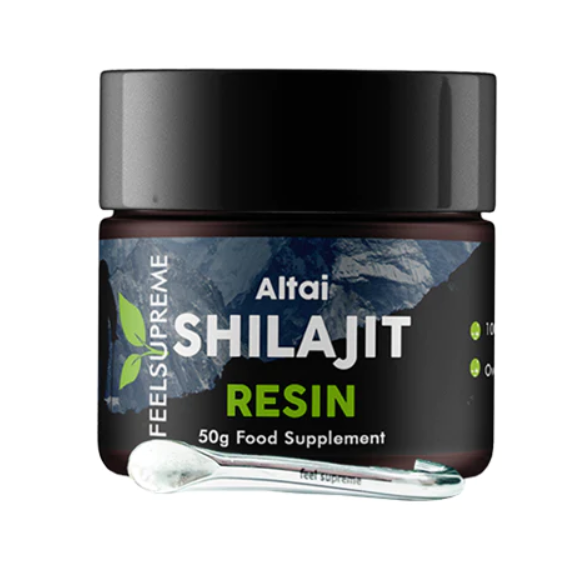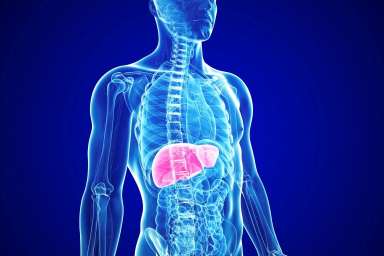
Shilajit
What is shilajit and should you take it?
Shilajit is a sticky, black-brown resin found in the rocks of the Himalayas. It is formed over centuries from decomposing plant matter. We know that doesn’t sound very appealing, but stay with us! This incredible material has some pretty impressive health benefits.
Shilajit is popular in Ayurvedic medicine thanks to its rich mineral content and high concentration of beneficial acids. Historically, it’s been used to treat everything from fractures and anaemia to eczema and impotence.
Read on for seven evidence-based benefits of shilajit…
Health benefits of shilajit
May slow the ageing process
In Ayurvedic medicine, shilajit was believed to promote longevity by slowing down ageing. It seems there’s some truth to this, with research suggesting that shilajit fights two major causes of ageing: inflammation and free radical destruction.
Shilajit’s anti-ageing effect is thought to be due to the high concentration of fulvic acid. This potent acid acts as an anti-inflammatory agent, and also contains antioxidants to neutralise free radicals and prevent cellular damage.
May support brain health
Fulvic acid is particularly beneficial to the brain. A build-up of certain natural proteins can cause damage to brain cells and impair cognitive function, but fulvic acid prevents these proteins from accumulating.
The same proteins are involved in the development of Alzheimer’s disease, and so is inflammation. A study published in the International Journal of Alzheimer’s Disease speculated whether this means that shilajit can protect people from neurodegenerative diseases like Alzheimer’s, or at least slow down their progression. They did point out that more research is needed before we can know for sure.
May support heart health
A high risk factor for heart disease is high blood triglycerides and LDL (“bad”) cholesterol. One human study found that shilajit significantly lowered both, and also increased levels of “good” HDL cholesterol.
Animal studies have shown positive results for heart health, too, with one group of researchers finding that shilajit protected rats from cardiac damage.
NOTE: If you have an active heart condition, experts suggest that you don’t take shilajit. It can reduce blood pressure, which can be dangerous for people with certain conditions. If in doubt, speak to your doctor.
May support reproductive health and fertility in men
Testosterone is a key hormone for men’s reproductive and general health. Low testosterone can lead to a low sex drive, fatigue, muscle loss and hair loss.
In a study where men were given shilajit twice a day for 90 days, researchers found that testosterone levels were significantly higher than in the men given a placebo.
Shilajit may also boost male fertility. Researchers gave shilajit to a group of infertile men and found that after 90 days, half of them showed increased sperm count and motility (how well the sperm move towards the egg).
May help fight obesity
Obesity is a leading cause of chronic illnesses like heart disease and type 2 diabetes. The extra weight can also have a painful impact on bones, muscles and joints, making it much harder to stay active.
One study found that shilajit activated certain genes in the obese participants that helped their muscles respond and adapt to exercise. This suggests that not only can shilajit make your muscles work more effectively during exercise, but it might also make exercise – and weight loss — easier in the first place by improving strength and reducing fatigue.
May help fight chronic fatigue
Chronic fatigue syndrome (CFS) causes extreme fatigue and a wide range of other debilitating symptoms. Not much is known about CFS, and there’s currently no agreed treatment or cure.
One theory is that CFS is caused by disfunction in the mitochondria. This is the part of the cell where energy is produced. An animal study seems to back this up, noticing that lab rats with CFS showed fewer symptoms and better mitochondrial function after being given shilajit.
More human studies are needed to see if shilajit has the same effect. However, researchers are hopeful that shilajit may be able to improve energy levels in chronic fatigue sufferers by fighting fatigue at its cellular source.
May increase iron levels
Iron is the most abundant mineral in the body and is essential for hundreds of functions, including red blood cell function and energy metabolism. Despite the importance, many of us don’t get enough, and others are unable to absorb the iron they do get.
Too little iron can lead to a condition called iron deficiency anaemia, with symptoms like fatigue, muscle weakness, headaches and trouble regulating temperature and heartbeat.
Shilajit is rich in both humic acid and iron. Both of these can help to prevent or treat this particular type of anaemia. In one animal study, this was achieved with just 21 days of supplementation.
Is shilajit safe?
Shilajit is safe for most people, but there are exceptions. We mentioned that people with an active heart condition should avoid it because it lowers blood pressure. This also applies to people with a history of low blood pressure and those taking medication to treat high blood pressure.
You should also avoid shilajit if you:
Have blood disorders like sickle cell anaemia, hemochromatosis (too much iron), or thalassemia.
Are pregnant or breastfeeding.
Suffer from gout.
If you have any other pre-existing conditions, or you take any medications, you should check with your doctor before taking shilajit just to be on the safe side.
Look for quality Shilajit
Regardless of your health, it’s important to only take purified shilajit. Raw shilajit can contain heavy metals, free radicals, fungi and even arsenic, so make sure you’re getting pure shilajit from a reputable brand, like Feel Supreme.




